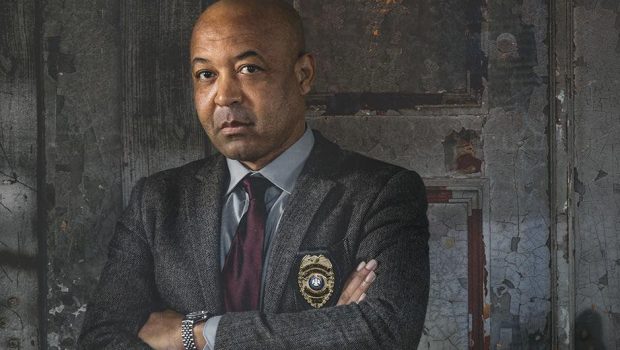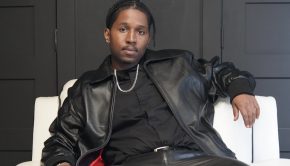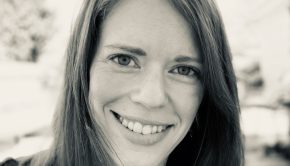Three Seasons In, Rod Demery From I.d. Channel’s “murder Chose Me” Still Shocked By The Shows Popularity!
After his mother was murdered and his brother was sentenced to life for committing a murder, Rod Demery dedicated his life to finding justice for families of murder victims.

Rod Demery has truly experienced both sides of homicide. Both cases resulted in life altering experiences for him. His mother lost her life. She was murdered when Rod was just 3-years old. Subsequently, 17-years later his brother loss his life after being sentenced to life for committing a murder. In their own way, both instances would shape, Rod’s adult life and he committed his life to bringing justice to families of homicide victims. Demery is now into his third season of I.D. Channel’s “Murder Chose Me,” which is based on his 14-years as a Shreveport, Louisiana Homicide Detective. Demery narrates as his role with the department is portrayed by, John Nicholson who through the show, has formed a friendship with, Demery. If justice was to be found, Demery was your guy. He has a perfect rating in that department as there has been a conviction or resolution to all 60-cases where he was assigned as the primary/lead detective role.
I recently caught up with, the former detective who takes us behind the scenes of the making of the show, it’s impact and the importance of solving these cases.
You essentially loss two close family members to murder. Your mother was murdered when you were very young, and your brother is serving a life-sentence because he committed a murder. Some people would push away from anything related to murder, what drew you to becoming a detective?
Rod Demery: I grew up…my grandparents raised me after my mother was killed. I had the typical southern Baptist grandmother. Man, she kept me in church. At the time I didn’t really understand it, I guess. All the dynamics at that time, but I got into police work pretty early on. It was when I got into homicide, I realized that all the things that happened, my mother being murdered and my brother committing a murder, I realized that, it was all in God’s divine plan. You read in “Jeremiah” “Before I formed you in your mother’s wound, I knew you.” I think all of that was a part of it. I went to college, I got a lot of police training, but I think for the most part of it, my training came from homicide. Understanding murder and the dynamics of it. Not just my mother being murdered which was the first obvious sign, but watching my grandparents, they had to take responsibility for me and my brother and seeing how that devastated her. She couldn’t really rest because the guy who killed my mother was never prosecuted. Later in life I found him and found out the story; or best I could of the story from police reports. So, growing up in that house for 18-years and watching my grandmother experience that, when I worked homicide, it was just impossible not to solve a homicide. I’m not going home until it’s done.
On the flipside of it, was my brother committing murder. Here is a kid I grew up with, riding skateboards, playing and doing all the things that kids do… well, he commits a murder. It took me about 15-years before I could actually speak to my brother. Once I got past that, I realized he was the same kid I was riding skateboards with. He’s still the same person and I will say that I learned to separate the crime from the criminal. It was my brother, but I despised everything that he did. And that’s been a challenge. My brother and I talk a little bit now, but sometimes I just don’t want to talk to him. Especially him knowing what he and I went to, to inflict that kind of agony upon anybody is ridiculous to me. It’s still my brother.
All of that translates into police work. I couldn’t walk away from a murder and kind of half do it. I had to put everything I had into it and when I interview suspects or talk to people about murder, I was able to see the person, not just the person who committed the crime. Those things are God given. You can’t learn that. You have to feel it.
The name of the show is, “Murder Chose Me,” I think John Nicholson does a great job of portraying you. Were you hands on with selecting the name of the show and what actor would portray you?
Rod Demery: Yeah, choosing the name of the show, it was during an interview; sizzle reel. They asked me a bunch of questions and one of the questions was, “In my police work, why did I choose to work murders?” And I said, “I didn’t, it chose me.” And that came from that scripture. I knew that’s what I was supposed to do. I don’t know if they knew that (laughing), but I definitely knew that.
As far as, Nicholson, my producer called me… my showrunner called me actually and he said, “Hey, they sent me a bunch of people, there are some people who auditioned in New York and Los Angeles and Atlanta,” and he sent me a bunch of pictures. I said, “I really don’t care.” He found, Nicholson and he was like, “Hey, you gotta see this guy.” Him and I both agreed that he was probably the best person for it. The other thing was, John and I hang out. After I met him, we met up in Knoxville, we hung out in L.A. a few times. We talk a bunch and we have a lot in common. The only thing he can’t get down is the way I walk, and my daughter says that. “Daddy, he just doesn’t walk like you.” But other than that, he’s a great guy (laughing). We have similar circumstances. His mother passed. She didn’t get murdered, but him and I could definitely relate to each other.
You have seen and witnessed things that you can’t un-see and a lead homicide detective. How do you cope with that in your everyday life?
Rod Demery: You know, it’s funny because it is, God given, and it was an ability to compartmentalize things. I can compartmentalize quite easily. I can go to work and do work because I could compartmentalize things. I didn’t see… what most people would see as a tragedy, I didn’t see it that way. It was a mission. I was in the military, so it’s all about the mission. It’s all about suspending everything in you personally and mentally and handling a job, so that wasn’t difficult. I think some of the difficult parts were not the crime scene or how horrific they were, it was the families. That sometimes kind of… I dealt with a lot of families and I used to always say, I get along with all of those people more than I do most police officers.
We form these lifelong friendships. I had a woman text me last night that she lost her brother and another lady text me that she lost her daughter. We talk quite a bit and they invite me over for dinner in Shreveport. It’s kind of a bond that we have made; kind of leaning on each other. I didn’t realize how much I leaned on them. It’s incredible, people who have lost so much are so compassionate towards me. I can remember working homicides and saying, “Baby, you gotta slow down. You just loss your daughter.” It’s just amazing the compassion and love that people have. That’s probably the most genuine.
You read people really well. I have been watching episodes of the show where I’m 100% convinced I know who committed the murder and after you conduct your interviews you will just get this feeling that they are not the ones involved, so it changes my whole thought process while watching. How important is that to have the ability to see past what they are being accused of or just the on the surface details of a crime?
Rod Demery: You know, Christianity again, and that’s the gift of the sermon and I have a really strong sense of it. I guess I have always had it. I remember as a kid, “Something ain’t right about this person,” (laughing). It’s absolutely important to be able to, not only put a crime together but actually, have that feeling to know what to listen to. I had a case where two guys were obviously the people who everybody thought did it. To the point where I was almost forced by the administration to arrest these guys. It was just something about them that just didn’t sit right with me. Obviously, there is nothing scientific about that. You have to have evidence to back up the guilt or innocence. But it plays a big role because it makes you look deeper. It’s frightening how many people are wrongfully convicted.
Recently, when I retired from the police department, I went to work for the district attorney’s office. There were three guys that I ended up reinvestigating their cases. One of them was in prison for 26-years, another was 21-years and the other was 18-years. I got them out of prison and just to think that the person who was working the case prior to it, didn’t have that sense. Couldn’t distinguish between you or me or anybody else. It happens mostly to people of color. That’s not to say that someone who is not black doesn’t understand black people, because I see some great white detectives. The big problem is, when you see a kid and you can’t tell the difference between a gangster and somebody that just wants to be a hip-hop look alike. There are a bunch of things that came together that gave me that ability. I think first and foremost that I recognize that it is the gift of the sermon. That’s a God given gift. It has worked in every aspect of my life. My kid’s hate it (laughing).
In most cases, these are some very sophisticated cases and the show only has an hour to do so. Do you feel like the show captures the key parts of these investigations without leaving a lot out given the timeframe they have to work with?
Rod Demery: I think they do a really good job of condensing it. Some of the little nuances… you try to get the most important things, but some of the little nuances are really important. Obviously, in an hour you can’t bring it all out. It can be something as simple as, how did I find this guy and what made me think he was a suspect. Or, I picked up a guy on a child support warrant and he ratted everybody out. And that’s usually the way it happens. Some things you obviously don’t have enough time. There are always little things, but I think for the most part they capture a lot of it because it goes from start to finish.
I watch the I.D. Channel all the time; probably too much to the point of it being morbid, but I don’t tune-in for the deaths, I enjoy the investigative work and forensic side of it. Did you ever think just being great at what you were doing would lead to this?
Rod Demery: Not at all (laughing). It came out of left field. I was in New York last week. I was at ID Con and Joe Kenda “Homicide Hunter” he and I were talking and we’re standing there doing a meet and greet type thing. All of these people were coming in and I looked at him and I said, “Joe, you know when I was standing at that, Circle K or Seven 7-Eleven doing a job, I never thought that this would happen.” And he was like, “Tell me about it.” When you’re a police officer, most people don’t like police officers, especially in this climate now. To go from that to people saying, “Wow!” He’s been doing it for 10-years and this is my third year and I gotta tell you, I’m still in shock. It’s still like, “Wow, someone really wants to watch me on TV,” and even more than that “Someone really wants to meet me.” It’s a very humbling experience.

I think these shows do an amazing job of humanizing police officers, showcasing investigative work and highlighting the amount of time put in. That helps sometimes to understand that it is a job and not just harassment.
Rod Demery: Yeah, and I think that’s the great thing about the I.D. Channel. It shows that there is good police work going on out there and they get to see the human side of you. Most people don’t understand that the police officers are absolutely human. It’s very interesting. The story last night, the detective that was working with me on that case. Super guy, but he’s a police officer. And I remember when we first started working together, there were so many people that said, he’s this he’s that, but he’s such a compassionate guy. And as I watched the story last night, I used to tease him a lot that he was overly sensitive. You could see him get emotional as he starts to talk about the case. That shows the incredibly sensitive side of it because the guy is incredibly sensitive, but as a police officer, he seems to be hardcore. People don’t realize that he has that capacity and those are the things that the show brings out that I think people need to see is that these guys are really-really super sensitive.
It’s out there that you have a 100% justice rate on cases where you served as the lead detective. Is that a rumor or is that accurate?
Rod Demery: That’s absolutely true. I have never been assigned as the primary homicide detective and didn’t close the case. I have worked 254 murders, I was the primary on 60 and all 60 were closed by arrest or if it was not a homicide, say it was manslaughter or suicide or something like that, yeah… it’s true (laughing). That is difficult for a lot of people to believe (laughing).
As a family, we religiously watch the show, I wish you continued success and hopefully this is the first of many interviews we conduct together.
Rod Demery: It has been a pleasure talking to you. This is all still a shock to me and it’s always good to talk to somebody that wants to listen. Again, I think my stage and my platform is really not about self-promotion, but I gotta glorify God and his redemption because there is no telling where I would have been had I not recognized his calling in my life. It’s a ministry and sometimes I do interviews and people really don’t want to hear that, but when I look back, it’s like that old spiritual, man, sometimes I wonder.
By: Percy Crawford
Tweet



































